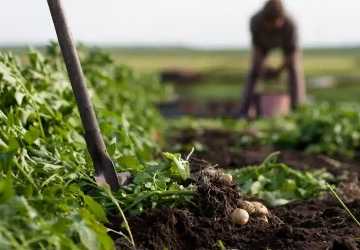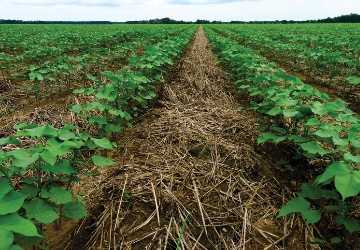The Advantages of Organic Farming
Organic farming is more than just a fashion label; it’s about growing food in harmony with nature, creating a healthier planet for all of us. From nourishing the soil to fostering vibrant ecosystems, the ripple effects of positive benefits from organic practices extend far beyond your taste buds.
Let’s explore some of the methods and techniques of organic farming and learn how to make organic farming environmentally friendly, giving you the best food and the healthiest environment.
The Power of Organic Farming: Caring for You and the Planet
So what are the benefits of organic farming for you and the planet? Let’s explore how organic practices can:
• Keep It Clean
You’re not unknowingly ingesting those harsh pesticides and herbicides. Organic farming avoids these chemicals, potentially reducing your exposure to harmful residues.

• Nutritional Powerhouse
When it comes to certain vitamins and minerals, organic plants may pack a bigger punch. Imagine if these foods weren’t just better for you, they might be more nutritious!
• Allergy Savior
For some people, organic food can be a game changer. Certain farming practices can reduce allergens in certain foods, making organic a potential ally for those with intolerances.
But organic qualities extend far beyond you. Let’s look at how they benefit the planet:
• Fighting Environmental Pollution
Eliminating synthetic fertilizers and pesticides means less air and water pollution. It’s a win-win for everyone!
• Happy Soil, Happy Plants
Organic farming nourishes the soil with natural nutrients, improving fertility and creating a healthy ecosystem where plants thrive.
• Vibrant
Organic farms are becoming havens for bees, butterflies, and other pollinators. The surge in biodiversity creates a thriving and balanced environment.
• Water — Are We Doing This Right?
Organic practices often focus on water-saving techniques to ensure this precious resource is used wisely.
Beyond Your Plate: The Ripple Effect and Wider Impact of Organic Farming
Did you know that organic farming goes far beyond your reach? The overall impact of organic farming can’t be overstated. Here’s how organic practices extend beyond the grocery department:
• Environmentally Conscious Advocates
Organic farmers are like environmental superheroes! They use water-saving techniques, which is impressive considering how precious this resource is.
• Ditching Fossil Fuel Dependence
Synthetic fertilizers and pesticides rely heavily on fossil fuels. Organic farming reduces this dependency and has a positive impact on climate change.
• Support Your Neighbors
Organic farms are often smaller, local businesses that prioritize ethical practices. By choosing organic products, you may be giving back to your community and supporting sustainable livelihoods.
• Fresh, Delicious Food From the Farm
Organic food often has to travel shorter distances, which means it arrives fresher and retains more nutrients. You may even find delicious options grown in your own garden!
Bring It Home: Small Steps, Big Impact
So are you ready to join the organic revolution? Here are some ways you can make a difference in your own kitchen:
• Be a Smart Shopper
Look for organic certifications at the store! They’re your guarantee that your food meets strict organic standards. Remember that organic food can sometimes be a little more expensive, but weigh the benefits against possible drawbacks (like availability).
• Join a CSA Group
Have you heard of Community Supported Agriculture (CSA)? It’s a great way to connect directly with local organic farms. Sign up to “share” the seasonal harvest and receive a regular box of fresh, delicious produce.
• Develop Your Own Gardening Skills
No spacious farm? No problem! Even a tiny balcony garden can be your organic oasis. Start with herbs or cherry tomatoes and enjoy the satisfaction of growing your own healthy farm.
Popular Organic Farming Methods
Here are some popular and clever organic farming techniques:
• Crop Rotation
This method involves growing different crops in the same field over the years. This helps improve soil fertility, reduce pest and disease problems, and fix nitrogen in the soil.
• Cover Cropping
Cover cropping are plants planted between cash crops or during fallow periods. They help suppress weeds, improve soil fertility, and prevent erosion.

• Biological Pest Control
Biological pest control involves using the natural enemies of pests to control pest populations. These insects include ladybugs, praying mantises, and nematodes.
• Biodynamic Farming
Biodynamic farming is an organic farming technique based on the ideas of Rudolf Steiner. Biodynamic farmers believe that the healthier the soil, the healthier the plants, and they use a variety of methods to promote soil health, such as: B. The use of compost tea and fertilizers.
Did you know? Fun facts about organic farming
• Be Happy
A Swiss government study found that organic farms keep 50% more species of bees than conventional farms. These hard-working pollinators are vital to our food system, so organic farming gives them a much-needed boost—another huge benefit of organic farming!
• Carbon Champions
Organic farming practices can help combat climate change. According to the Rodale Institute, one hectare of organic farmland can store up to 3,250 kg of CO2 per year. Imagine the impact if more farms went organic!
• Global Movement
Organic farming is a global phenomenon. There are more than 2.8 million organic farmers in more than 180 countries around the world. That’s a lot of people working towards a healthier planet!
The Bottom Line: Cultivating a Better Future, Bit by Bit
Organic farming isn't just a fad. It's an effective way to nourish your body and protect the planet. We explore the key benefits of organic farming - how organic practices produce healthier food with fewer chemicals, create a thriving environment full of life, and even support local communities.
Switching to organic doesn't have to be overwhelming. Every smart decision you make at the grocery store, every connection you make with your local CSA, and even that little jar of organic herbs on your windowsill helps build a healthier world. So put aside the misconceptions and harness the power of organic farming. It's a win for your taste buds, a win for the planet, and a win for a better future for everyone. Remember, every bite counts!